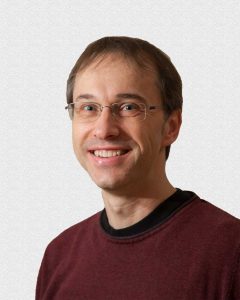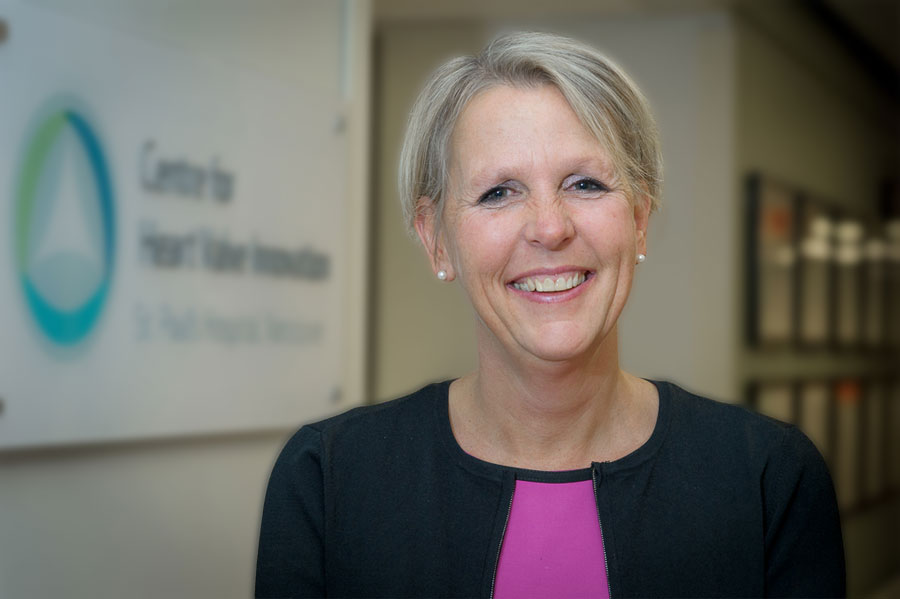CHÉOS’ newest Scientist sees herself as a health researcher with an interest in how innovative health systems work and how practice change can be implemented to benefit patients.
Three Decades at PHC
Dr. Sandra Lauck has spent most of her 30-year career at Providence Health Care, which she describes as a “nursing powerhouse”. After working as a staff nurse in acute and critical care areas, she became a Nurse Educator in the Cardiac Intensive Care Unit and Interventional Cardiology program at St. Paul’s Hospital while attending UBC to pursue a Master’s degree followed by a PhD.
“I went back to school with the intention to become a better educator” she said. “This route combined the proximity with clinical care with my desire to pursue scholarship.”
The completion of her Master’s degree led to a decade as Clinical Nurse Specialist for the transcatheter heart valve program at St. Paul’s. Dr. Lauck also received a Heart and Stroke Research Fellowship and a CIHR Doctoral Research award which led her to pursue a PhD. She completed her PhD thesis, entitled “Change in patient-reported outcomes after cardioverter-defibrillator implantation” in 2013 — CHÉOS Scientists Drs. Rick Sawatzky and Karin Humphries served on her doctoral committee.
“Nursing has an exceptional lens through which we can look at health care,” she noted. “We operate at the interface between the patient and the system; this makes us, by definition, knowledge translators.”
Diverse Research Program
Dr. Lauck describes her research as consisting of two pillars: (1) the development of clinical pathways to support innovation throughout the process of care, and (2) embedding the collection and use of patient-reported outcomes (PRO) into clinical care.
In her research relating to clinical pathways, Dr. Lauck has been involved in a number of studies at the Centre for Heart Valve Innovation relating to the treatment of valvular heart disease: The 3MTAVR Study, FRAILTY-AVR, and PERFORM-AVR.
“In the 3MTAVR Study, I worked with Drs. David Wood and John Webb and a team of collaborators at 13 sites to show that reorganizing the way we care for elderly patients undergoing transcatheter aortic valve replacement [TAVR], a minimally invasive valve replacement, using the Vancouver Clinical Pathway in elderly patients resulted in safe next day discharge home for most patients” she said.
“Before the implementation of this pathway, most patients would have a general anaesthesia, recover in critical care, and only leave the hospital after 4 or 5 days,” she added. “Working collaboratively with our multidisciplinary Heart Team, we transitioned to the use of local anesthesia, reduced the risks associated with older people staying in hospital, and achieved superior outcomes. Together, we changed the way we care for TAVR patients.”
Dr. Lauck and other members of the study team are now in the process of sharing their findings and techniques with other centres around the world with the goal of this clinical pathway becoming the new standard of care.
Measuring and Managing Frailty
Despite vast improvements to technique, aortic valve replacement can still result in death and disability. Frailty is an important risk factor for negative outcomes after this procedure but is poorly predicted by age alone. The FRAILTY-AVR Study compared a number of frailty assessment tools and their ability to predict complications or death after cardiac surgery or transcatheter procedures; results from this study were published last year.
“Working with Dr. Jonathan Afilalo from McGill University, who led the FRAILTY-AVR Study, we figured out how to best measure frailty. Now, the next step is to determine how to treat it, which led to The PERFORM-AVR Study” she noted.
The PERFORM-AVR Study is an on-going multisite trial that compares the combination of a 12-week supervised exercise program and a protein supplement to traditional lifestyle counselling in elderly patients post-TAVR. The primary outcome is the degree of frailty, measured by the Short Physical Performance Batter (SPPB), which was chosen based on the findings of the FRAILTY study. The secondary outcome of the study is patient-reported quality of life, which aligns with the second pillar of Dr. Lauck’s research program.

“We know that PRO can be collected in a robust, valid manner and can become important data used to monitor patients during follow up,” she said. “However, educating multidisciplinary teams about this type of data and how to meaningfully incorporate it into clinical care is a challenge.”
To meet this challenge, Dr. Lauck is collaborating with CHÉOS’ Dr. Rick Sawatzky to study the feasibility of implementing an electronic solution to improve the measurement and use of PROs in the Centre for Heart Valve Innovation at St. Paul’s. Dr. Lauck’s new project, supported in part by an Early Career Research Initiative award from the St. Paul’s Hospital Foundation and PHCRI, will seek to determine how to better capture the perspectives and needs of the frail elderly population undergoing transcatheter procedures.
“The approach we have been using in these studies could be applicable to the cardiac and other clinical programs,” she noted. “We are caring for an increasingly elderly population and we need to incorporate their perspectives and experiences in a more effective and meaningful way, manage frailty better both as a risk factor and as an outcome, and connect this important data in our standard practice.”
Dr. Lauck is also heavily involved in the Practice-Based Research Challenge and is currently mentoring four teams at different stages in that process. Two of the four are part of the newest round of funding. The first will qualitatively explore nurses’ experiences of caring for patients experiencing delirium after open heart surgery. The second will look at how patients and their caregivers report changes in health following a heart valve procedure.



